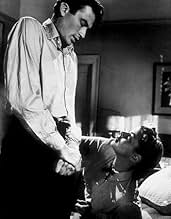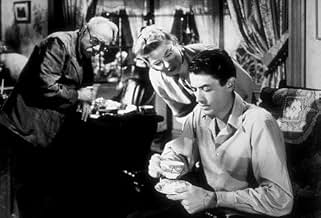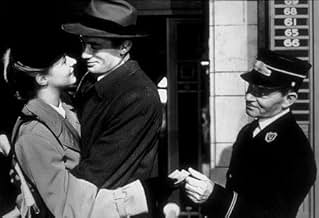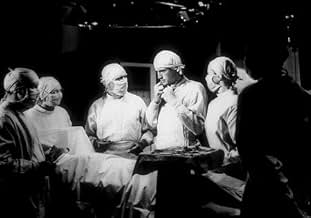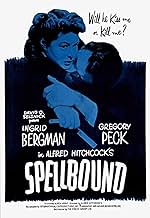Un psiquiatra oculta la identidad de un paciente amnésico acusado de asesinato mientras intenta que recuperare la memoria.Un psiquiatra oculta la identidad de un paciente amnésico acusado de asesinato mientras intenta que recuperare la memoria.Un psiquiatra oculta la identidad de un paciente amnésico acusado de asesinato mientras intenta que recuperare la memoria.
- Dirección
- Guionistas
- Elenco
- Ganó 1 premio Óscar
- 8 premios ganados y 7 nominaciones en total
Jean Acker
- Matron
- (sin créditos)
Irving Bacon
- Railway Gateman
- (sin créditos)
Richard Bartell
- Ticket Taker
- (sin créditos)
Harry Brown
- Gateman
- (sin créditos)
Resumen
Reviewers say 'Spellbound' is a captivating blend of romance, mystery, and psychological intrigue, showcasing Alfred Hitchcock's signature style. The innovative dream sequences by Salvador Dali are praised for their surreal dimension. Ingrid Bergman and Gregory Peck deliver acclaimed performances, with Bergman as a dedicated psychoanalyst and Peck as an amnesiac suspect. The suspenseful plot, involving a murder mystery and mind exploration, is noted for its twists. However, some find the pacing slow and dialogue melodramatic. The haunting musical score by Miklós Rózsa is celebrated. Despite mixed opinions, 'Spellbound' is regarded as a noteworthy Hitchcock film.
Opiniones destacadas
While I wouldn't include 'Spellbound' in my top five favourite Alfred Hitchcock movies it's still wonderfully entertaining. Of course it had dated badly in some ways, but not enough to spoil a modern viewer's enjoyment. Psychoanalysis was still quite a cinematic novelty at the time, but this means that we have to put up with an awkward opening sequence, complete with "explanations" on the screen, and a few pretty hokey moments throughout, but hey, I can live with that, and the amateurish filmed skiing scene. These few flaws, quite a rarity for Hitchcock, are still small potatoes. The legendary Salvador Dali designed dream sequence allegedly used very little of the great surrealists outlandish ideas, but even so it's striking and memorable. I also really enjoyed the inventive score by Miklos Rozsa, which utilized the eerie sound of the theremin, later used in the science fiction classic 'The Day The Earth Stood Still', and The Beach Boys psychedelic pop masterpiece 'Good Vibrations'. Now the best thing about 'Spellbound' and what really makes it into a wonderfully entertaining mystery/romance is Ingrid Bergman and Gregory Peck. These two Golden Age superstars are both absolutely wonderful individually, but together they are magical, and one of THE great romantic couples in movie history. 'Spellbound' may not be Hitchcock's very best work, but I still highly recommended it. I can't see how anyone could not enjoy it.
One of the first films in Hollywood to deal with the subject of psychoanalysis, Alfred Hitchcock's Spellbound is an expertly crafted psychological thriller that works equally well as a brain teaser for its viewers. It tells the story of a psychiatrist who protects the identity of an amnesia patient, disguised as the new head of a mental asylum, and covers her attempts to recover his memory.
Cleverly directed by Alfred Hitchcock, the film is full of twists & turns throughout its runtime and repeatedly plays a dream sequence that toys with viewers' mind like a strong puzzle asking to be solved. Cinematography is a stunning work of film-noir, editing keeps the tension alive from start to finish & thanks to its terrific use of music, it manages to keep the viewers at the age of their seats for the majority of its runtime.
And also worth mentioning are its brilliant performances from Gregory Peck, Michael Chekov & the immensely beautiful Ingrid Bergman amongst whom Bergman impressed me the most for I was completely in awe of her. On an overall scale, Spellbound is a spellbinding tale by the master of suspense that never lets out the entertainment factor for its viewers & keeps them invested in its story with a sense of self-generated curiosity. Highly recommended.
Cleverly directed by Alfred Hitchcock, the film is full of twists & turns throughout its runtime and repeatedly plays a dream sequence that toys with viewers' mind like a strong puzzle asking to be solved. Cinematography is a stunning work of film-noir, editing keeps the tension alive from start to finish & thanks to its terrific use of music, it manages to keep the viewers at the age of their seats for the majority of its runtime.
And also worth mentioning are its brilliant performances from Gregory Peck, Michael Chekov & the immensely beautiful Ingrid Bergman amongst whom Bergman impressed me the most for I was completely in awe of her. On an overall scale, Spellbound is a spellbinding tale by the master of suspense that never lets out the entertainment factor for its viewers & keeps them invested in its story with a sense of self-generated curiosity. Highly recommended.
I recently saw this film on the large screen after having not seen it for over 10 years. My memories of it were not that fond -- I recalled it as an unusually melodramatic and not very convincing thriller enlivened by a very attractive cast.
What I had forgotten about was how almost impossibly silly all the psychoanalytical claptrap is, especially in the first couple of reels, which thereby make us feel very quickly that we're not quite in the mature, masterful grip of Hitch's usual wit and taste. Yes, I know this was made in the 40's, but the first 20 to 30 minutes of the film have more sexist moments and infantile behavior by supposed doctors than one would ever expect from either Hitch or Ben Hecht.
So who's to blame? One guess -- David O. Selznick! That being said (along with the fact that the story doesn't really add up to much of anything, since all the premises on which it's based seem so shaky, naive and downright goofy), the film has some things going for it. About midway through the picture, when Michael Chekhov appears as Dr. Brulov, the film suddenly kicks into what we might call "classic British Hitch mode," with the kind of understated wit and ensemble playing the director had been doing so well since the early 30's. It almost becomes another (and far more palatable) film at this point. The scenes with Bergman, Peck and Chekhov are the highlight of the film, and I have to admit that I'm even kind of fond of the hotel lobby scene, with the appealingly breezy Bill Goodwin (of "Burns and Allen" radio fame) as the house detective. Peck has never been more handsome, in a strangely fragile way.
Also worth a look are the brief but truly unusual Dali-designed dream sequences. There is something to be said for Miklos Rozsa's score as well: although it edges a bit far into soupy overscoring, the expressive main theme has quality, and his use of the theremin (which he also employed in his score for THE LOST WEEKEND at virtually the same time) is striking and represented "something new" in film music.
One could easily make excuses for this film based on "it was only 1945" or "what people knew about psychoanalysis was still naive", etc., but even taken in context of its time it's a pretty silly film without the kind of sustained surety of style leavened with simultaneous suspense, intelligence, taste and humor that he had already proved he could do so well from more than ten years earlier. Given a standard he had already given us with examples from THE 39 STEPS or YOUNG AND INNOCENT through THE LADY VANISHES in the UK, or FOREIGN CORRESPONDENT and SHADOW OF A DOUBT here in the US, this film seems not up to his true capacities, and like his other Selznick-produced American film, REBECCA, seems both overfussy and filled with emphases and spoonfeeding of details which Hitch himself would never have given us.
You need only compare this film with his very next one, NOTORIOUS, to be painfully aware how much better Hitchcock on his own -- using his own standards of pace, momentum and the ADULT treatment of script themes -- could be when not under the thumb of Selznick. Thank God he didn't have to work for him any more after this.
What I had forgotten about was how almost impossibly silly all the psychoanalytical claptrap is, especially in the first couple of reels, which thereby make us feel very quickly that we're not quite in the mature, masterful grip of Hitch's usual wit and taste. Yes, I know this was made in the 40's, but the first 20 to 30 minutes of the film have more sexist moments and infantile behavior by supposed doctors than one would ever expect from either Hitch or Ben Hecht.
So who's to blame? One guess -- David O. Selznick! That being said (along with the fact that the story doesn't really add up to much of anything, since all the premises on which it's based seem so shaky, naive and downright goofy), the film has some things going for it. About midway through the picture, when Michael Chekhov appears as Dr. Brulov, the film suddenly kicks into what we might call "classic British Hitch mode," with the kind of understated wit and ensemble playing the director had been doing so well since the early 30's. It almost becomes another (and far more palatable) film at this point. The scenes with Bergman, Peck and Chekhov are the highlight of the film, and I have to admit that I'm even kind of fond of the hotel lobby scene, with the appealingly breezy Bill Goodwin (of "Burns and Allen" radio fame) as the house detective. Peck has never been more handsome, in a strangely fragile way.
Also worth a look are the brief but truly unusual Dali-designed dream sequences. There is something to be said for Miklos Rozsa's score as well: although it edges a bit far into soupy overscoring, the expressive main theme has quality, and his use of the theremin (which he also employed in his score for THE LOST WEEKEND at virtually the same time) is striking and represented "something new" in film music.
One could easily make excuses for this film based on "it was only 1945" or "what people knew about psychoanalysis was still naive", etc., but even taken in context of its time it's a pretty silly film without the kind of sustained surety of style leavened with simultaneous suspense, intelligence, taste and humor that he had already proved he could do so well from more than ten years earlier. Given a standard he had already given us with examples from THE 39 STEPS or YOUNG AND INNOCENT through THE LADY VANISHES in the UK, or FOREIGN CORRESPONDENT and SHADOW OF A DOUBT here in the US, this film seems not up to his true capacities, and like his other Selznick-produced American film, REBECCA, seems both overfussy and filled with emphases and spoonfeeding of details which Hitch himself would never have given us.
You need only compare this film with his very next one, NOTORIOUS, to be painfully aware how much better Hitchcock on his own -- using his own standards of pace, momentum and the ADULT treatment of script themes -- could be when not under the thumb of Selznick. Thank God he didn't have to work for him any more after this.
Alfred Hitchcock makes his customary quick cameo at 38:52-38:55 at the Empire Hotel lobby in New York City. He's exiting an elevator, smoking a cigarette.
Alfred Hitchcock weaves his spell binding magic into this Francis Beeding novel. In some opinions, this is Hitchcock's best project from the 40's. Powerful stars and a great story line keeps your interest until the final shot.
An amnesia patient(Gregory Peck)is believed to be a psychotic killer. Bits and pieces of his memory about a childhood accident makes him believe that he is a murderer. Ingrid Bergman plays a young psychiatrist, who helps Peck unravel his past and regain his memory and mental health. During this process, the lovely doctor tries not to fall in love with her needy patient. She takes him to her old professor(Michael Chekhov) for help. He is reluctant to get involved with solving the mystery to clear the patient's name.
Brilliant camera work and being filmed in black & white really helped the story line. There is an eye opening dream sequence designed by Salvador Dali that is down right mystic.
The strong and talented cast also includes: Regis Toomey, Leo G. Carroll and Rhonda Fleming. This film is worth the time to watch again and again.
An amnesia patient(Gregory Peck)is believed to be a psychotic killer. Bits and pieces of his memory about a childhood accident makes him believe that he is a murderer. Ingrid Bergman plays a young psychiatrist, who helps Peck unravel his past and regain his memory and mental health. During this process, the lovely doctor tries not to fall in love with her needy patient. She takes him to her old professor(Michael Chekhov) for help. He is reluctant to get involved with solving the mystery to clear the patient's name.
Brilliant camera work and being filmed in black & white really helped the story line. There is an eye opening dream sequence designed by Salvador Dali that is down right mystic.
The strong and talented cast also includes: Regis Toomey, Leo G. Carroll and Rhonda Fleming. This film is worth the time to watch again and again.
¿Sabías que…?
- TriviaSir Alfred Hitchcock was disappointed with the limits of Gregory Peck's facial expressions. According to Peck, "I couldn't produce the facial expressions that Hitch wanted turned on. I didn't have that facility. He already had a preconception of what the expression ought to be on your face, he planned that as carefully as the camera angles. Hitchcock was an outside fellow, and I had the Stanislavski training from the Neighborhood Playhouse, which means you work from the inside."
- ErroresThe burn on J.B.'s hand is only visible when Petersen notices it. It disappears in every other scene where his hand is visible (like when he is sitting on the couch with Dr. Brulov).
- Citas
Dr. Alex Brulov: Women make the best psychoanalysts until they fall in love. After that they make the best patients.
- Créditos curiososOpening credits: THE FAULT . . . . . IS NOT IN OUR STARS, BUT IN OURSELVES . . . . . - SHAKESPEARE
Our story deals with psychoanalysis, the method by which modern science treats the emotional problems of the sane.
The analyst seeks only to induce the patient to talk about his hidden problems, to open the locked doors of his mind.
Once the complexes that have been disturbing the patient are uncovered and interpreted, the illness and confusion disappear.....and the devils of unreason are driven from the human soul.
- Versiones alternativasThe original theatrical version had an Overture and Exit Music by Miklós Rózsa, to a total running time of 118m09s. It was suppressed from distribution until the 1999 restoration based on the negatives of Selznick library (that came to be owned by Walt Disney Company via ABC-TV) and two DVD editions.
- ConexionesEdited into The Clock (2010)
Selecciones populares
Inicia sesión para calificar y agrega a la lista de videos para obtener recomendaciones personalizadas
- How long is Spellbound?Con tecnología de Alexa
- What is 'Spellbound' about?
- Is "Spellbound" based on a book?
- What does the opening caption say?
Detalles
- Fecha de lanzamiento
- País de origen
- Idioma
- También se conoce como
- Spellbound
- Locaciones de filmación
- Penn Station, Manhattan, Nueva York, Nueva York, Estados Unidos(establishing shot of the first train station)
- Productoras
- Ver más créditos de la compañía en IMDbPro
Taquilla
- Presupuesto
- USD 1,696,377 (estimado)
- Total a nivel mundial
- USD 19,288
- Tiempo de ejecución1 hora 51 minutos
- Color
- Relación de aspecto
- 1.37 : 1
Contribuir a esta página
Sugiere una edición o agrega el contenido que falta

Principales brechas de datos
What is the Hindi language plot outline for Cuéntame tu vida (1945)?
Responda

